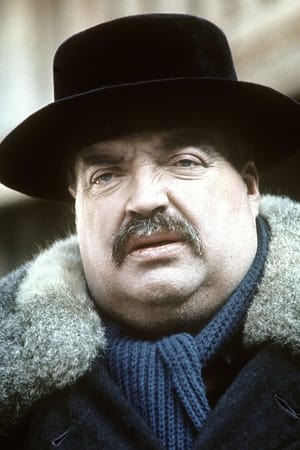
Helmut Qualtinger
Helmut Qualtinger was born in Vienna, Austria. He initially studied medicine, but quit university to become a newspaper reporter and film critic for local press, while beginning to write texts for cabaret performances and theater plays. Qualtinger debuted as an actor at a student theater and attended the Max Reinhardt Seminar as a guest student. Beginning in 1947, he appeared in cabaret performances. In 1949, Qualtinger's first theatrical play, Jugend vor den Schranken, was staged in Graz. Up to 1960, Qualtinger collaborated on various cabaret programmes with the Namenlosen Ensemble made up of Gerhard Bronner, Carl Merz, Louise Martini, Peter Wehle, Georg Kreisler, and Michael Kehlmann. Qualtinger was famous for his practical jokes. In 1951, he managed to launch a false report in several newspapers announcing a visit to Vienna of a (fictional) famous Inuit poet named Kobuk (author of "The Burning Igloo"). The reporters who assembled at the railway station however were to witness Qualtinger, in fur coat and cap, stepping from the train. Asked about his "first impressions of Vienna", the "Inuit poet" commented in broad Viennese dialect, "Haaaßis'sdo - [It's hot here]". The short one-man play Der Herr Karl, written by Qualtinger and Carl Merz and performed by Qualtinger in 1961, made the author known across German-speaking countries. "Herr Karl", a grocery store clerk, tells the story of his life to an imaginary colleague - from the days of the Habsburg empire, the First Austrian Republic, the Austrofascist regime leading up to the Anschluss (annexation) by Nazi Germany, World War II and finally military occupation by Allied forces in the 1950s, seen from the perspective of a one who is a prototypical opportunist. Qualtinger's portrayal of the petit-bourgeois Nazi collaborator came at a time when "normality" had just been restored and Austrians' involvement in the Nazi movement was being downplayed and "forgotten", making many enemies for the author, who even received anonymous threats of murder. Beginning in the 1970s, Qualtinger frequently performed recitals of his own and other texts, including excerpts from Adolf Hitler's Mein Kampf and Karl Kraus' Die letzten Tage der Menschheit (The Last Days of Mankind). These recitals were highly popular and resulted in several records being published. Qualtinger played countless theater, TV and film parts, making his final appearance in The Name of the Rose in 1986, along with Sean Connery. Qualtinger died in Vienna on 29 September 1986, of a liver condition. From Wikipedia, the free encyclopedia
Known For
Credits
- 2019 ·Ikonen Österreichsas Self (archive footage)
- 2011 ·Qualtingeras
- 1986 ·The Abbey of Crime: Umberto Eco's 'The Name of the Rose'as Self
- 1986 ·The Name of the Roseas Remigio da Varagine
- 1986 ·The Diary of Dr. Döblingeras Dr. Döblinger
- 1985 ·Cat's Gameas Viktor
- 1985 ·Helmut Qualtinger liest Mein Kampfas
- 1982 ·Krimistundeas Harry Beggs
- 1981 ·Die Hinrichtungas
- 1979 ·Tales from the Vienna Woodsas Zauberkönig
- 1978 ·Feuerwasseras Sepp O'Brian
- 1978 ·End of the Gameas Von Schwendi
- 1978 ·Grandisonas Dr. Ludwig Pfister
- 1977 ·Abelard - Die Entmannungas
- 1977 ·Mulligans Rückkehras Mulligan
- 1976 ·Die Alpensagaas Allinger
- 1976 ·Mitgiftas Huck
- 1975 ·Eiszeitas Officer
- 1975 ·Von und mit....Helmut Qualtingeras
- 1974 ·Krankensaal 6as Ragin
- 1974 ·3 nach 9as Self
- 1974 ·Der Kultereras Kulterer
- 1973 ·Der große Zauberer - Max Reinhardtas Self
- 1973 ·Weights and Measuresas Anselm Eibenschütz
- 1972 ·Wer war Andre Heller?as Himself
- 1971 ·Die heilige Johannaas Soldat
- 1971 ·Geschäfte mit Plückhahnas Erwin Plückhahn
- 1971 ·König Johannas Johann Plantagenet, König von England
- 1970 ·Passion eines Politkersas Nationalrat Bröschl
- 1970 ·Das weite Landas Natter
- 1969 ·Die Geschichte der 1002. Nachtas Ignaz Trummer
- 1969 ·Diary of a Serial Killeras Rudi Böhm
- 1968 ·Das vierte Gebotas Schalanter
- 1968 ·The Castleas Bürgel
- 1967 ·Der Paukenspieleras Ferry
- 1967 ·Kurzer Prozeßas Inspektor Pokorny
- 1967 ·Umsonstas Pitzl
- 1967 ·Der Herr Karlas Herr Karl
- 1966 ·Der Fall Bohras Matzenauer
- 1966 ·Sambaas Capitano Agamemnon Heredia
- 1966 ·Die Hinrichtungas Scharfrichter Engel
- 1965 ·Lumpazivagabundusas Knieriem, ein Schustergeselle
- 1965 ·Der Himbeerpflückeras Konrad Steisshäuptl
- 1965 ·Radetzkymarschas Kapturak
- 1963 ·Biedermann und die Brandstifteras Schmitz - ein Ringer
- 1962 ·Einen Jux will er sich machenas Melchior - Hausknecht
- 1962 ·Das Profilas Self
- 1961 ·Geschichten aus dem Wienerwaldas Oskar
- 1961 ·Mann im Schattenas Oberpolizeirat Dr. Radosch
- 1961 ·Die Kurveas Ministerialdirigent Kriegbaum
- 1960 ·The Magnificent Rogueas Seppl Reber
- 1959 ·Die schöne Lügnerinas Detective Zawadil
- 1959 ·Mikosch im Geheimdienstas Oberst Fedor Fedorowitsch Ganiew
- 1958 ·Man müßte nochmal zwanzig seinas Kanzakis
- 1957 ·Das Abgründige in Herrn Gerstenbergas Der Schlechtere
- 1957 ·Scherben bringen Glückas Wollner
- 1955 ·Hanussenas Ernst Röhm
- 1955 ·Sonnenschein und Wolkenbruchas Werbefachmann
- 1955 ·Du bist die Richtigeas Orientalischer Fürst
- 1954 ·König der Manegeas Mirko
- 1953 ·Hab’ ich nur Deine Liebeas Direktor Pokorny
- 1953 ·Einmal keine Sorgen habenas Kraps
- 1952 ·April 1, 2000as
- 1951 ·Deutscher Filmpreisas Self
